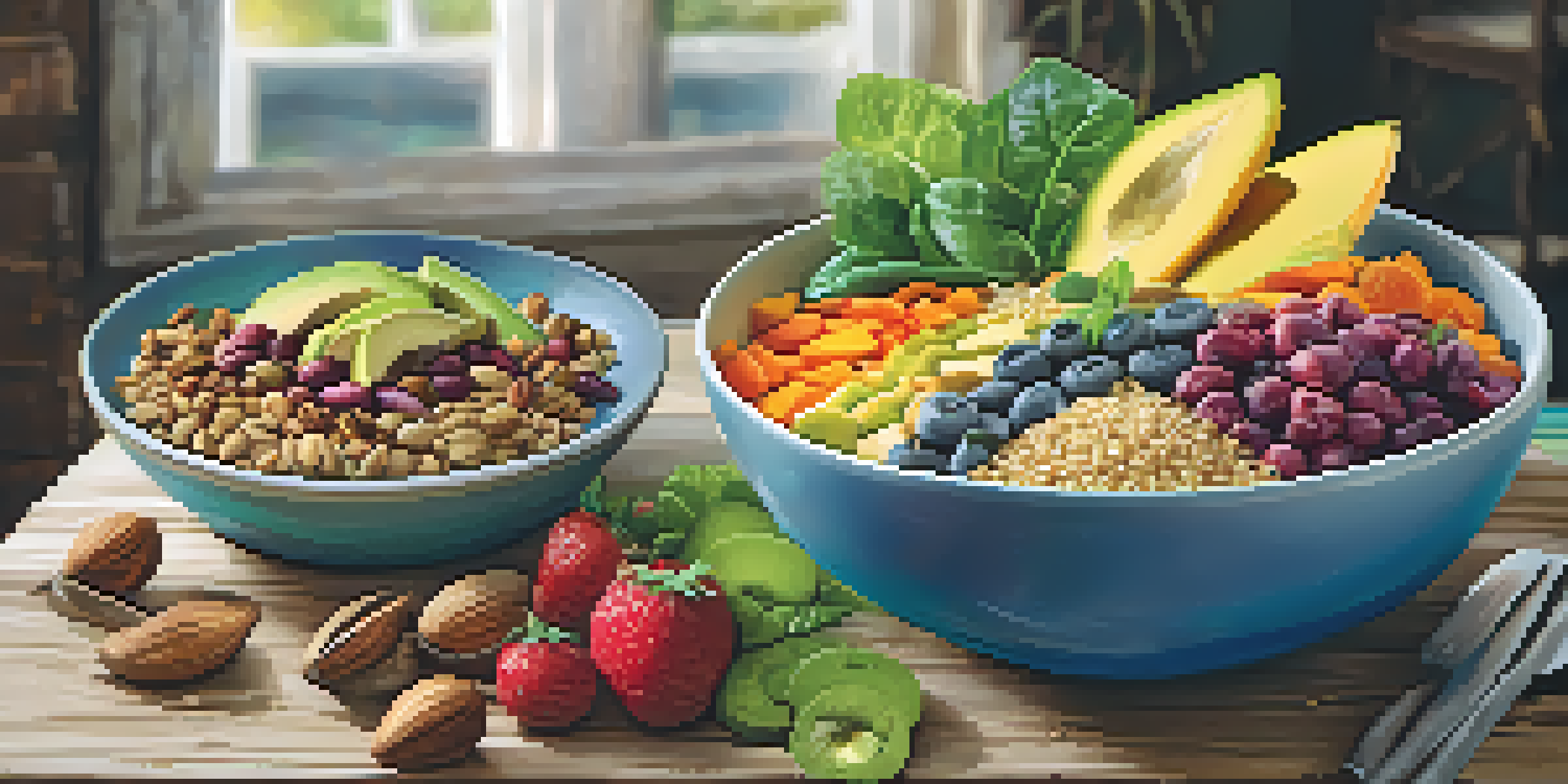Exploring Plant-Based Diets for Kids

Understanding Plant-Based Diets for Kids
A plant-based diet focuses mainly on foods derived from plants, including fruits, vegetables, nuts, seeds, oils, whole grains, legumes, and beans. For kids, this means they can enjoy a colorful variety of foods that are not only delicious but also packed with nutrients. It's important to note that a plant-based diet doesn't have to be strictly vegetarian or vegan; it can include small amounts of animal products if desired.
The greatest wealth is health.
One of the key benefits of a plant-based diet is its potential to improve overall health. Research suggests that children who eat more fruits and vegetables tend to have better immune systems, healthier weights, and reduced risk of chronic diseases later in life. Plus, teaching kids to enjoy a variety of plant foods early on can set the foundation for lifelong healthy eating habits.
However, introducing a plant-based diet for kids requires some planning. Careful attention needs to be given to ensure they receive all essential nutrients, such as protein, iron, calcium, and vitamins B12 and D. By incorporating a range of plant foods and possibly using fortified products, parents can support their child's nutritional needs effectively.
Health Benefits of Plant-Based Diets for Children
One of the most significant advantages of a plant-based diet is its association with better heart health. Foods like whole grains, fruits, and vegetables are rich in fiber and low in saturated fats. This can contribute to lower cholesterol levels, which is crucial for developing hearts in children.

Additionally, plant-based diets are linked to improved digestion. High-fiber foods help keep the digestive system running smoothly, which can be especially important for kids who may struggle with common issues like constipation. By including plenty of beans, lentils, fruits, and vegetables, parents can support their child's digestive health.
Benefits of Plant-Based Diets
A plant-based diet can enhance children's health by improving heart health, digestion, and cognitive function.
Moreover, a diet rich in plants has been shown to enhance cognitive function and boost energy levels. Nutrient-dense foods provide the fuel kids need for their busy days, whether they’re at school or playing sports. A well-balanced plant-based diet can help children stay focused and energized throughout their activities.
How to Introduce Plant-Based Foods to Kids
Introducing plant-based foods to children can be as simple as making it fun and engaging. Start by incorporating more fruits and vegetables into their meals, perhaps by creating colorful smoothies or fun veggie platters. Kids are often more willing to try new foods when they are presented in an appealing way.
Let food be thy medicine and medicine be thy food.
Another effective strategy is to involve kids in meal preparation. Letting them help wash vegetables, mix ingredients, or even pick out recipes can spark their interest in plant-based meals. This hands-on approach not only makes them more excited about trying new dishes but also teaches them valuable cooking skills.
Gradually replacing animal products with plant-based alternatives can also make the transition smoother. For example, try swapping ground beef for lentils in tacos or using almond milk instead of cow's milk. By making small adjustments, you can help kids adapt to a plant-based diet without overwhelming them.
Creative Plant-Based Meal Ideas for Kids
When it comes to meal ideas, the possibilities are endless! Consider making a colorful vegetable stir-fry with a variety of veggies and tofu, served over brown rice for a hearty meal. You can also whip up a delicious quinoa salad packed with beans, corn, and diced avocado for a refreshing lunch option.
For snacks, try making energy bites using oats, nut butter, and dried fruits. These bites are not only nutritious but also easy for kids to grab on the go. Another fun idea is to create homemade veggie chips by baking thin slices of sweet potatoes or kale with a sprinkle of seasoning.
Nutritional Awareness is Key
Parents must ensure their kids receive essential nutrients like protein, iron, and vitamin B12 while following a plant-based diet.
Don't forget about breakfast! Smoothie bowls topped with fruits, nuts, and seeds can be a fun way to start the day. You could also make pancakes using whole grain flour and mashed bananas, providing a delicious and healthy morning treat.
Addressing Nutritional Concerns for Plant-Based Kids
While a plant-based diet can be very healthy, parents should be aware of certain nutritional concerns. For instance, proteins are essential for growth, so it's crucial to include sources like beans, lentils, chickpeas, and quinoa in their meals. Parents can also incorporate plant-based protein powders if needed, especially for active kids.
Iron is another vital nutrient to monitor, as plant-based sources are not as easily absorbed as those from animal products. Foods like spinach, lentils, and fortified cereals can help meet iron needs, but pairing them with vitamin C-rich foods like citrus fruits can enhance absorption.
Lastly, vitamin B12 is essential for nerve function and energy levels, and it’s mainly found in animal products. Parents may consider fortified foods or supplements to ensure their child receives enough B12. Consulting with a pediatrician or nutritionist can help tailor a plant-based diet that meets all nutritional requirements.
Making Plant-Based Eating a Family Affair
Getting the whole family involved in a plant-based diet can make the transition easier and more enjoyable. Planning meals together and trying out new recipes as a family can help everyone feel included in the process. This not only fosters a sense of teamwork but also allows for shared experiences around food.
Family meals can also be a great opportunity to discuss the benefits of plant-based eating. Engaging kids in conversations about where their food comes from and how it impacts their health and the environment can help them appreciate the choices they’re making. This understanding can motivate them to embrace plant-based foods wholeheartedly.
Make It a Family Experience
Involving the whole family in plant-based meal planning and preparation fosters teamwork and encourages healthy eating habits.
Moreover, consider scheduling regular plant-based cooking nights where everyone takes a turn choosing and preparing a dish. This can create lasting memories while reinforcing healthy eating habits. Plus, it’s a fun way to explore different cuisines and flavors together!
Encouraging Healthy Habits Beyond the Plate
Introducing a plant-based diet is just one part of fostering healthy habits in kids. Encouraging regular physical activity is equally important for their overall well-being. Whether it's playing outside, joining a sports team, or participating in family hikes, active lifestyles complement good nutrition.
Another aspect to consider is mindfulness around food. Teaching kids to listen to their hunger cues and understand when they are full can help them develop a healthy relationship with food. Practicing mindful eating during family meals—like savoring flavors and enjoying conversations—can reinforce this habit.

Lastly, being a positive role model is crucial. When kids see their parents enjoying plant-based meals and leading an active lifestyle, they are more likely to adopt similar behaviors. It's all about creating an environment that supports health and wellness, making it a natural part of their lives.